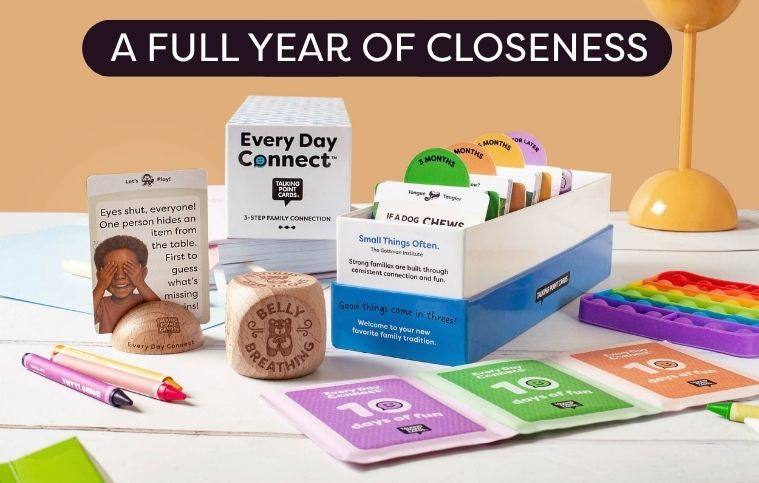SHOP
About
Breaking the Silence
How to Start and Sustain Engaging Family Conversations

You're all gathered around the dinner table, forks drifting aimlessly as everyone stares at their plates. The silence is deafening. Somebody coughs. You wonder if now's a good time to bolt for the door—except you're pretty sure the floorboards would creak and then everyone would just be staring at you staring at them staring back and it would be even worse.
We've all been there. Family conversations can be tough! Especially these days, when we're all stimulated out the wazoo and would much rather be scrolling mindlessly than really conversing.
But it doesn't have to be that way. With a little conscious effort, some family chit-chat can be the opposite of torturous. It can actually be...enjoyable?? Wait, where are you going?
"Family life is a never-ending conversation."
Andrew Lovekin

No really, hear me out. Beyond just beating boredom, there are some compelling reasons to make small talk a big priority with the fam:
-
Bonding quality time. Chatting helps keep close relationships, well, close. It's a chance to really check in and connect beyond just grunts and surface-level updates.
-
Family social skills. Back-and-forth dialogue teaches kids communication skills that'll help them at school, with friends, and later in their careers and other relationships.
-
Teaching values. Your convos give you a chance to convey your family's core beliefs and code of ethics in a calm, low-stakes setting.
Plus, the benefits go both ways. Kids who feel heard and able to share their authentic thoughts and opinions grow in self-confidence—and are more likely to keep talking openly when they become teens and need that support more than ever.
So in a nutshell: Conversation = bonding, teaching, and happy, healthy, confident kids. No big deal, right?

How to Start
Keeping It Light
Though there's value in the occasional deep or difficult discussion, generally you'll want to keep family conversation positive and light, at least at first. Build up a habit of easy back-and-forths before expecting kids to gladly bare their souls over the mashed potatoes.
Here are some go-to openers to get the friendly dialogue flowing:
Ask About Their Day
"How was your day today? What did you do at school/for fun/at work?"
Don't just go through the motions—really listen to their response and react with follow-up questions. Pro tip: if you ask for specifics, you can't get just a "fine" and leave it at that.
Share a Laugh
"I have to tell you about this super cringey thing that happened in the break room today..."
Bonding through simultaneous giggles is a time-honored tradition for a reason. It helps you feel like you're all on the same team.
Bring Up a Fun Fact
"Did you know that a pack of rogue ring-tailed lemurs once took over an abandoned Dorney Park in Pennsylvania and ruled as kings for five years? What do you think they got up to??"
Who can resist an absurd side-fact conversation starter? Open-ended sillies like these engage imagination and laughter and can lead in any number of amusing directions.
Ask Their Opinion
"Have you heard about this politician's crazy [policy idea/scandal/stunt]? What do you make of it?"
Asking for their perspective on current events helps them feel respected and their thoughts valued, and exercises their critical thinking. As long as the topic's not too heavy, opinion-gathering is great for casualdinnertime chitchat.
Going Deeper

Once everyday dialogue starts feeling more natural, try gently steering things in a deeper direction sometimes. You don't have to get too philosophical right away—baby steps like asking about preferences, values, and goals can go a long way:
Ask About Their Interests
"So Aaron, I know you've been working on that one gaming hobby with the little plastic figurines. What exactly about that piques your interest? What do you enjoy most about it?"
Questions that probe for specifics on what truly excites and fulfills them show your engaged interest and help reveal their burgeoning identity in a chill, casual way. Make it convo, not an interrogation.
Share Stories/Lessons From Your Life
"When I was your age, I had this best friend who started making some bad choices and we started drifting apart...here's how it all went down and what I learned."
Stories from your real-life experiences—not preachy lectures—are how values and nuggets of wisdom go down easiest. Casually weave the moral or learning into the narrative, not as a blatant lesson, more like an "aha!" you arrived at through trial & error. Let them relate it to their own lives.
Ask About Their Dreams
"If you could do absolutely anything in life, with zero limits, what would your dream career/life/adventure look like?"
Use imagination to tap into the aspirations that excite them most. Explore their "dream scenario" together—it's a fun chance for unfiltered expression and also a window into their blossoming interests, priorities, and sense of identity. No judgments, no shut-downs, just engaging with their inner world.
Give Advice
"Hey, can I give you a real, big brotherly perspective on this whole situation? Here's how I'd try to handle it..."
At some point the sharing goes two ways—though it's hard not to be preachy, try making your suggestions as specific to their scenario and level as possible. Get their take first, listen, then weigh in with advice grounded in your experience. If you've built an open flow of dialogue, they'll be more inclined to hear you out.

Keep the Momentum Going
Once you get a good conversational ball rolling, do whatever you can to keep that good energy and sense of bonding going strong:
Bring It Up Everywhere
Don't restrict chit-chat to the table. Look for chances to start little dialogs in the car, doing dishes together, out running errands—anywhere quality hang sesh time pops up. Normalize and integrate conversation as just a regular part of family life and time spent together.
Ask Follow-Up Questions
When someone shares something—e.g. an interest, an issue, a goal—act interested! Ask plenty of follow-up questions to show you care and want to dig deeper: "Oh that's so cool, how did you first get into that? What exactly about it appeals to you? Where do you hope to take it? How can I support?"
Validate Their Perspective
We all want to feel heard and understood. When kids share an opinion or idea, find the root of where they're coming from and validate it, even if you disagree overall:
"I totally get why you might feel that way, because of [x] reason you mentioned."
Then you can delve into your different take on it from a place of mutual understanding.
Keep It Positive
Above all, keep conversations positive, supportive vibes. Zero criticism or put-downs allowed. You're building an atmosphere of trust and vulnerability, not a cross-examination. If you inadvertently say something insensitive, own it, apologize sincerely, and correct course for next time.
Leave Them Wanting More
As good as your conversation skills get, don't be a conversation hog! Leave room to pause and breathe so they stay engaged. And end things before you've droned on forever, leaving everyone wanting just a little more quality time together before next time.
Over time, putting these principles into regular practice can start transforming family conversations from teeth-gritting to actually energizing and connecting.
Overcoming Common Hurdles

In an ideal world, fun and meaningful conversation would just flow constantly with zero hitches. But reality likes to get messy—and chatty. Expect occasional hurdles like:
Awkward Silences
Don't you hate it when conversation fizzles to crickets? To conquer the cringe, have a mental bank of go-to conversation starters ready. If all else fails, even just blurting "So! [Random observation about surroundings] Pretty crazy, huh?" can jolt things out of a rut. The key is being unafraid to power through the weirdness and kickstart new dialogue.
Distractions & Divided Attention
Between cell phones, TV, video games, and our collective fried attention spans, something's always vying for everyone's focus. Nip tech distractions in the bud from the jump by establishing some basic etiquette like:
-
Putting phones away/on silent during meals & family hangouts
-
Agreeing to pause shows/games for a little while for convo time
-
Taking general tech breaks & going into rooms screen-free as a group
If dividing attention is still an issue, call it out kindly but firmly. Gently remind everyone why undivided quality time matters.
Disengaged Participants
Sometimes a kid will be in a mood and simply refuses to chat no matter what verbal greasing you apply. Other times, a quiet/shy type may willfully opt out no matter how you try to include them.
Don't force it too hard—that'll likely backfire. Keep the convo positive and comfortable for those willing to engage. Work on building trust and creating a general atmosphere where even the reluctant realize there's zero harsh judgment.
You can also ask directly what would help them feel more engaged and open to participating. And look for creative reframes like:
"Yo, Johnny's been awfully quiet tonight...we talkin' about stuff that bores you, man? What's a topic more up your alley that you'd be down to riff on?"
The more you identify and accommodate their personal wavelength, the comfier they'll be to pipe up over time.
Tone/Content Issues
Sometimes conversations venture into territory that gets too heated, controversial or mature for the situation. Other times, it's just the overall tone or vibe feels off-putting or unwelcoming.
Have a subtle system in place for pumping the brakes before things derail. A partner can give you a subtle "uh oh" look or signal to steer things in a better direction. Or you can jump in lightly with:
"OK, let's please change the subject to something a bit more [upbeat/mild/etc.]..."
Don't make too big a deal out of it—that'll just make matters worse. Just smoothly guide everyone back to more positive conversational pastures.

The Payoff
Sure, cultivating quality family conversation requires active, ongoing effort. But few things are more worth it than establishing open, engaging dialogue as the norm—not just the exception.
You're building bonds, identity, values, and communication skills that will last far beyond your child's childhood. If you embrace talking as an essential part of simply being a family, you'll slowly create a supportive space for everyone to blossom in openness, empathy and connection.
You'll strengthen resiliency through life's ups and downs by keeping communication flowing. You'll have amazing chances to directly influence who your kids become and how they move through the world. And you'll all emerge wiser from exploring each other's fascinating inner worlds.
I think the biggest mistake I made... was this whole idea of not sharing my thoughts and feelings with my children.
Princess Diana
So grab some pizza rolls and put down those phones. It's family chit-chat time, baby.
LIKED THIS ARTICLE?
SIGN UP FOR MORE!







